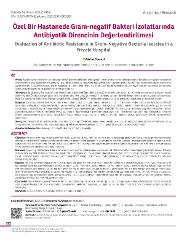| dc.description.abstract | Amaç: Hastane kaynaklı enfeksiyonlara sebep olan dirençli gram-negatif bakteri enfeksiyonları giderek artan bir sorun haline gelmektedir. Bu bakterilerde gelişen karbapenem
direnci nedeniyle tedavi seçenekleri kısıtlanmakta, hastanede kalış süresi uzamakta ve mortalite artmaktadır. Bu durum tigesiklin ve kolistin gibi seçeneklerin tedaviye eklenmesine
gerektirmektedir. Bu çalışmanın amacı, özel bir hastanede çeşitli klinik örneklerden izole edilen, Gram-negatif bakterilerin sıklığı ve duyarlılıklarının saptanması ile hastalarda
uygun antibiyotik seçiminde yol gösterici verileri ortaya koymaktır.
Yöntemler: Bu çalışmada, Özel Kadıköy Florence Nightingale Hastanesi’nde Şubat 2018 ile Şubat 2019 tarihleri arasında çeşitli klinik örneklerden izole edilen 1109 gram-negatif
bakteri incelendi. Örneklerde üreyen bakteriler konvansiyonel yöntemler, Vitec 2 (Biomeriux, Fransa) otomatize sistem ile üretici firmanın önerileri doğrultusunda tanımlanmıştır.
Duyarlılık testleri Vitec 2 (Biomeriux, Fransa) otomatize sistem ile yapıldı, EUCAST kritelerine göre yorumlandı. Veriler retrospektif olarak alınarak değerlendirilmiştir.
Bulgular: Çalışmaya dahil edilen örneklerin en sık kan ve idrar örnekleri olmuştur. Tanımlanan bakteri türlerin türü ve duyarklılığına bakınca Escherichia coli (%50,9)
için en etkili antibiyotikler meropenem (%99,6), imipenem (%99,2), fosfomisin (%98,5), amikasin (%96,7), kolistin (%98,3), tigesiklin (%96,7) idi. Klebsiella spp. için en etkili
antibiyotikler amikasin (%95,2) ve meropenem (%92,6), imipenem (%92), kolistin (%95,8), tigesiklin (%96,7) idi. Proteus spp. için en etkili antibiyotikler, meropenem (%95,7),
piperasilin/tazobaktam (%95,7) ve fosfamisin (%91,2) saptanmıştır. Tigesiklin duyarlılığı ise %15,4 olarak saptanmıştır. Enterobacter spp. için en etkili antibiyotikler imipenem
(%100), amikasin (%100) ve siprofloksasin (%93,1) iken. Pseudomonas aeruginosa için en etkili antibiyotikler amikasin (%80,3), siprofloksasin (%77,4), kolistin (%94,7)
saptanmıştır.
Sonuç: Her merkez kendi klinik örneklerinden izole edilen gram-negatif bakteri dağılımını, direnç paternini ve yıllara göre değişimini bilmelidir. Hastane enfeksiyonları ve
antibiyotik direncini önlemek için her hastanenin uyguladığı, enfeksiyon kontrol komitesinin sorumluluğunda bir antibiyotik yönetim planı olmalıdır. | en_US |
| dc.description.abstract | Objective: Resistant gram-negative bacterial infections that cause hospital-acquired infections are becoming increasingly problematic. Due to the carbapenem resistance that
develops in these bacteria, treatment options are restricted, the duration of hospitalization is longer and the mortality increases. This requires the addition of options such as
tigecycline and colistin to treatment. The aim of this study is to determine the susceptibility of gram-negative bacteria isolated from various clinical specimens in a private hospital
and to determine the appropriate antibiotics in patients.
Methods: In our study, 1109 bacterial strains which were produced in various clinical samples were examined in Private Kadıköy Florence Nightingale Hospital between February
2018 and February 2019. Bacteria in the samples are defined in accordance with the recommendations of the manufacturer of the conventional methods, Vitec 2 (Biomeriux,
France) automated system. Sensitivity tests were performed by Vitec 2 (Biomeriux, France) automated system and interpreted according to EUCAST criteria. The data were
retrospectively evaluated.
Results: The most common samples of the study were blood and urine. The most effective antibiotics for Escherichia coli (50.9%), based on the type and sensibility of
the identified bacterides, were meropenem (99.6%), imipenem (99.2%), fosfomycin (98.5%), amikacin (96.7%), colistin (98.3%), tigecycline (96.7%). Klebsiella spp. the most
effective antibiotics were amikacin (95.2%) and meropenem (92.6%), imipenem (92%), colistin (95.8%) and tigecycline (96.7%). The most effective antibiotics for Proteus spp.
were meropenem (95.7%), piperacillin/tazobactam (95.7%) and phosphomycin (91.2%). The sensitivity of tigecycline was found to be 15.4%. The most effective antibiotics for
Enterobacter spp. were imipenem (100%), amikacin (100%) and ciprofloxacin (93.1%). The most effective antibiotics for Pseudomonas aeruginosa were amikacin (80.3%),
ciprofloxacin (77.4%), colistin (94.7%) was determined.
Conclusion: Each center is supposed to know the distribution of gram-negative bacteria, resistance patterns and changes in years, isolated from their own clinical samples. In
order to prevent hospital infections and antibiotics, there must be an antibiotic management plan under the responsibility of the infection control committee that is applied by
the hospital. | en_US |
















